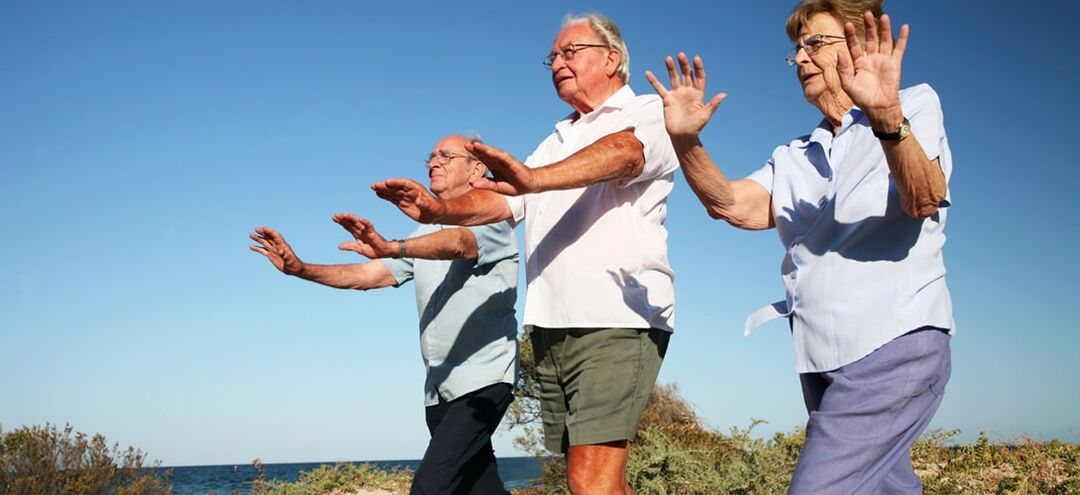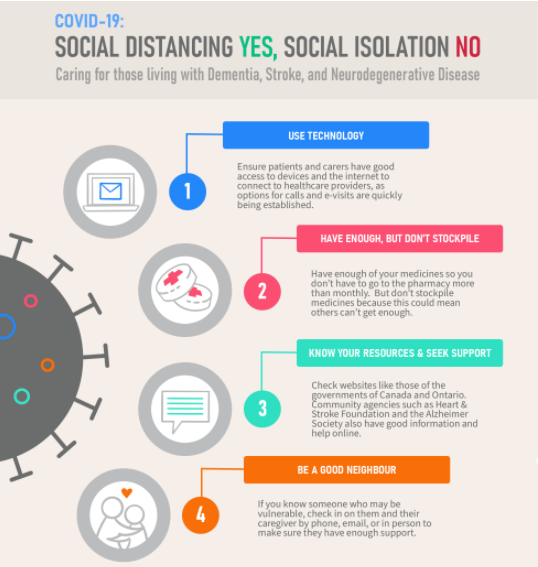ONDRI Partners with Community to Share Senior Care Solutions Early in the Pandemic

How is OBI bringing lab to life > Accessible information, tools and programs + Collaborative research and partnerships
“The COVID-19 pandemic has challenged all of us, bringing new stresses into everyday life. For individuals living with brain disorders, as well as their families and care partners, negative impacts of the pandemic have been disproportionate and pronounced”, says Christina Stergiou-Dayment, Senior Director of Provincial Programs and Partnerships with the Alzheimer Society of Ontario and ONDRI Patient & Community Advisory Committee (PCAC) member. “People living with dementia need a support system and helpful information to promote quality of life, now more than ever. It was for this reason that the collective voices of the ONDRI PCAC came together in the early days of the pandemic, promptly addressing concerns and sharing actionable information with our stakeholders.”
“People living with dementia need a support system and helpful information to promote quality of life, now more than ever. It was for this reason that the collective voices of the ONDRI PCAC came together in the early days of the pandemic, promptly addressing concerns and sharing actionable information with our stakeholders.”
Christina Stergiou-Dayment, Senior Director of Provincial Programs and Partnerships with the Alzheimer Society of Ontario and ONDRI Patient & Community Advisory Committee (PCAC) member
At OBI, we have set a high bar to establish Ontario as a world leader in brain research, commercialization and care. That requires a lot of work behind the scenes – facilitating partnerships across institutions and stakeholders that promote and advance brain health. One such partnership emerged in the early days of the COVID-19 pandemic and created a unified voice to convey reliable information on senior care, emphasizing the needs of those living with dementia. This partnership drew in the expertise and resources of OBI, ONDRI (OBI’s neurodegenerative diseases research program), its PCAC, including the Alzheimer Society of Ontario, Heart & Stroke, Parkinson Canada, ALS Society of Canada, MINT Memory Clinics, along with Regional Geriatric Programs of Ontario and individuals with lived experience.
ONDRI collaborates with the PCAC on many levels, from patient engagement in research, to sharing science and knowledge with the community. But a unified message coming from all community partners was all the more important – especially due to the abundance of information available, and oftentimes questionable reliability.
COVID-19 puts seniors at risk, particularly those over 65, while also having a greater impact on those with other chronic conditions like stroke and dementia - which can be isolating on their own. The strategies used to “flatten the curve” and limit spread (handwashing, social distancing, limiting in-person visiting) are especially difficult for someone with memory or mobility issues – i.e. individuals who need help with things like buying groceries, preparing meals and bathing. Therefore, it was important to prompt care partners on how to properly distance without isolating their loved ones – as isolating seniors can have detrimental long-term effects on their overall wellbeing.

ONDRI worked with its PCAC to reassure and remind the community that there are some easy things we can all do to help ensure the health and well-being of those living with dementia, stroke and other neurodegenerative diseases. The team produced and disseminated a joint statement on the importance of social connectivity and support called “Social Distancing YES, Social Isolation NO.”
This partnership is in line with OBI’s commitment to collaboration and to unify the brain health community. This helpful, step-by-step statement serves as a guide and also includes a user-friendly infographic that outlines four important points to manage care during the pandemic: use technology; make sure you have enough, but don’t stockpile medications; know your resources and seek support; and be a good neighbour.
Due to the volume of information and mixed messages on the internet and in the media, along with the uncertainty of the situation in general, the joint statement was quickly picked up by the media and Dr. Richard Swartz, ONDRI Investigator, appeared on CTV Your Morning.
“The willingness to partner and act swiftly is what makes this project all the more unique”, says Ruth Kruger, Strategist - Communications & Stakeholder Relations, ONDRI. “The most important thing to consider then was community and it’s because of that thinking we were able to achieve something remarkable.”
The collaboration between OBI, ONDRI and the ONDRI PCAC is a crucial example of prioritizing community gains over individual gains. At OBI, we know we can improve brain health if we harness our strengths, join forces and utilize our resources to share knowledge and innovation with the community at large. We are happy to continue our work, at the forefront and behind the scenes, as a facilitator to improve the brain health of indivudials in Ontario, Canada and around the world.
Find more information on ONDRI, its PCAC and the latest research coming out of the program here.
